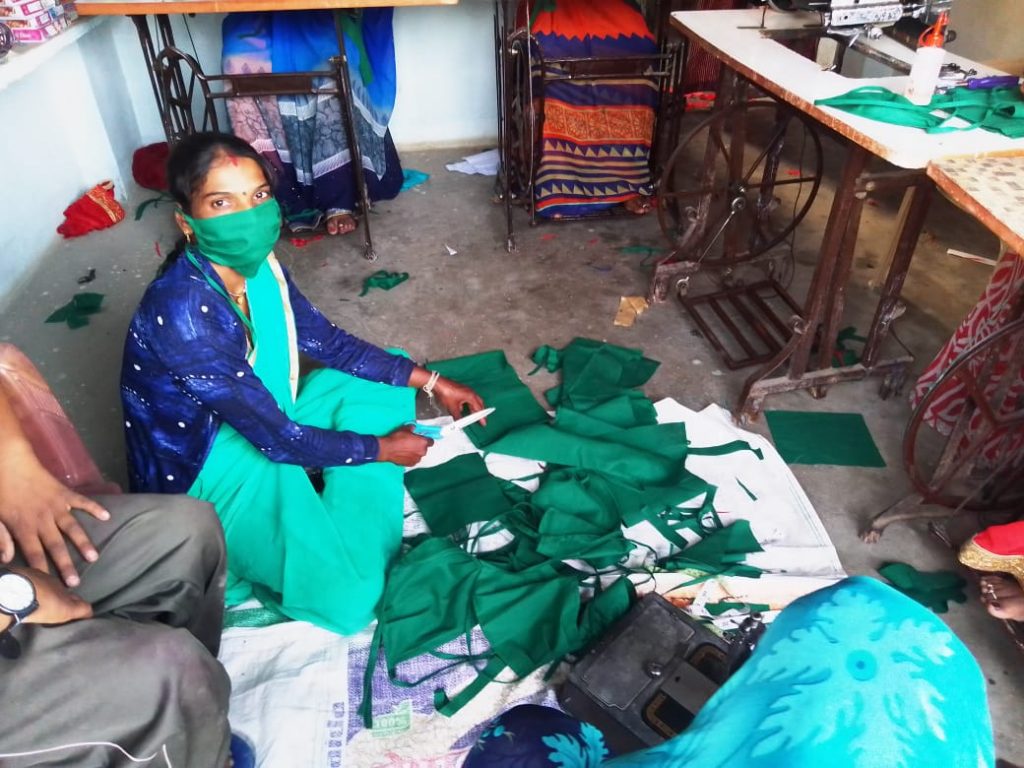
Shivkumari, an Internet Saathi from Rewa, Madhya Pradesh, is currently producing 300 masks per day and is supplying it to the local hospitals. At the time of writing, she had received an order of 16,000 masks from a government hospital out of which she has delivered 2500. There are several others who are preparing a sanitiser making unit as well. This helped us in recognising the potential of the digital centers that are now being converted into manufacturing hubs for essential needs.
DEF has more than 600 digitally enabled Community Information resource Centers across 130 backward districts in 25 States – all located in rural areas for the service of poorest of the poor.
In response to the COVID-19 pandemic, DEF has launched the Digital Emergency Relief Program (https://www.youtube.com/watch?v=9HGcnIYen9c), and a COVID-19 task force has been formed to undertake several initiatives to cover local households, individuals at the Panchayat level and address their needs, concerns and issues resulted due to Covid-19. This will further assist local district and other agencies in Covid-19 entitlement, essential service, money transfer and grievance redressal.
The Covid-19 pandemic has unimaginably affected social, economic, institutional and governance settings worldwide. It has generated an unparalleled health crisis affecting thousands of people, forcing over 3 billion people to be locked at home. While the adverse and wholesome impact of Covid-19 is yet to be measured, in this entire catastrophic scenario, the poor, vulnerable, low social and low income groups and informal sectors in India are the worst affected in multitude ways.
According to an initial survey conducted by Digital Empowerment Foundation on the impact of the lockdown across rural India, scarcity of food grains with almost 24% stating that it is not available at all. This was followed by the dearth of sanitisers and masks according to 21% and 25% respondents respectively.
The government announced that ration kits will be provided to all daily wage labourers. To help speed up the process one of the DEF co-ordinators Gurudev Singh in Alwar, Rajasthan, along with the Ward councillor immediately conducted a survey to prepare a list of those who are in dire need of these benefits. He created a kit which includes 500 grams cooking oil, 500 grams lentils, 5 kilogram wheat and 1 kilogram rice which was distributed to 45 households. Similarly, DEF coordinators in Nuh (Haryana) and West Champaran (Bihar) have created a task force who have got permission from the district collector to help with community outreach, mobilisation and distribution of necessary items like food and medicines.
Further, since the lockdown has limited the access to most of the important services such as financial assistance, the internet can give access to information, entitlements and financial services.
The aim of C-DERP is to reach more than 3,00,000 households in need. Simultaneously, the organisation is creating a cadre of 600 Covid-19 Digital Volunteer Force (C-DVFs) for facilitation and deliverance of these services. The idea is to create a model which can be replicated and is scalable for Covid-19 and any other pandemic situations.
Apart from these issues, the other immediate concern that requires attention is lack of physical and mental health counselling, the spread of misinformation and fake news that is leading to a panic situation, lack of information on data, linkages and facilitation of entitlements and the strains on livelihood and income opportunities. To address this, Crowdsourced Covid-19 Information Resource Kit has been published which is currently available in English and Hindi. It is a one-stop source of information on everything related to corona virus. The survey highlighted that the main source of information on Covid-19 for 53% respondents is through mobiles with WhatsApp ranking the highest. Hence, this kit will enable the 600+ digitally enabled information resource centers and 10,000+ foot soldiers across 25 states and union territories in public schemes, information dissemination, entitlement facilitation and its delivery. Internet support will be extended to facilitate tele-health services along with consultation and counselling.



